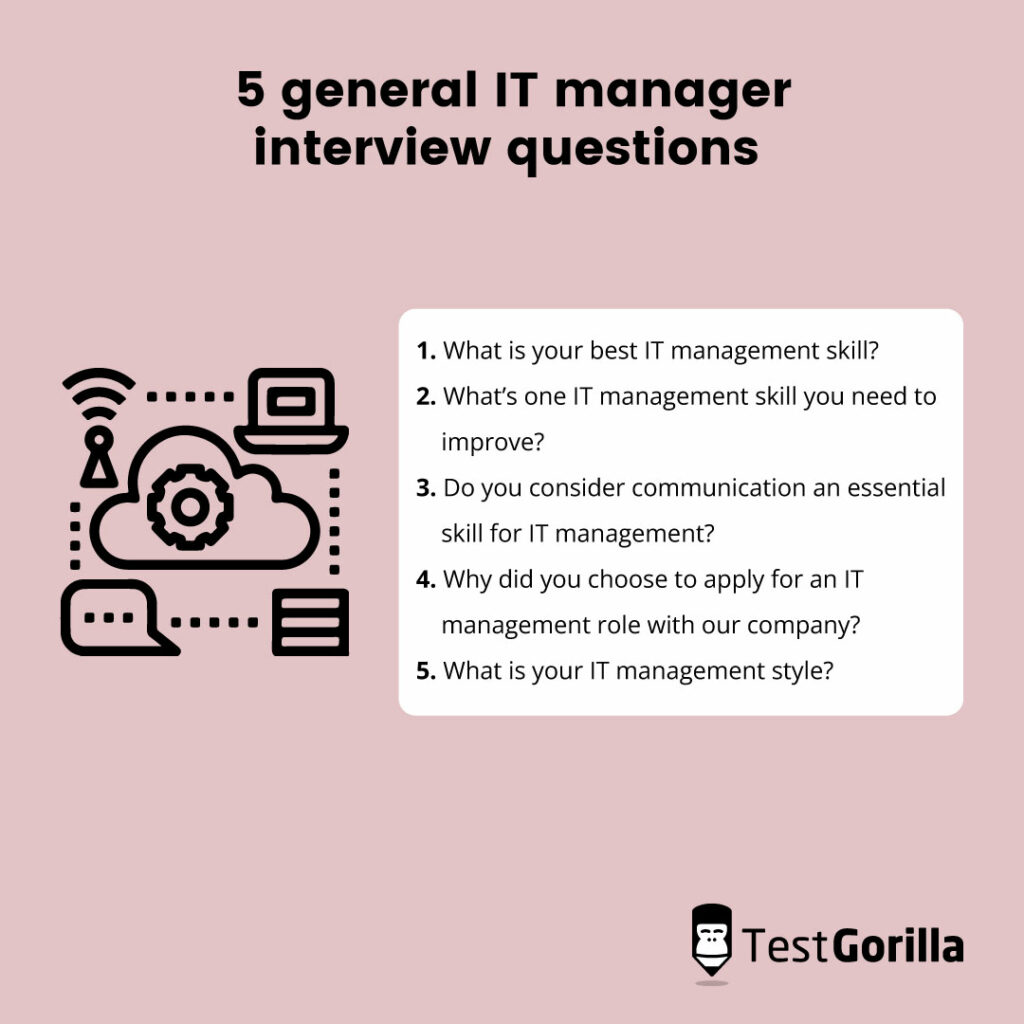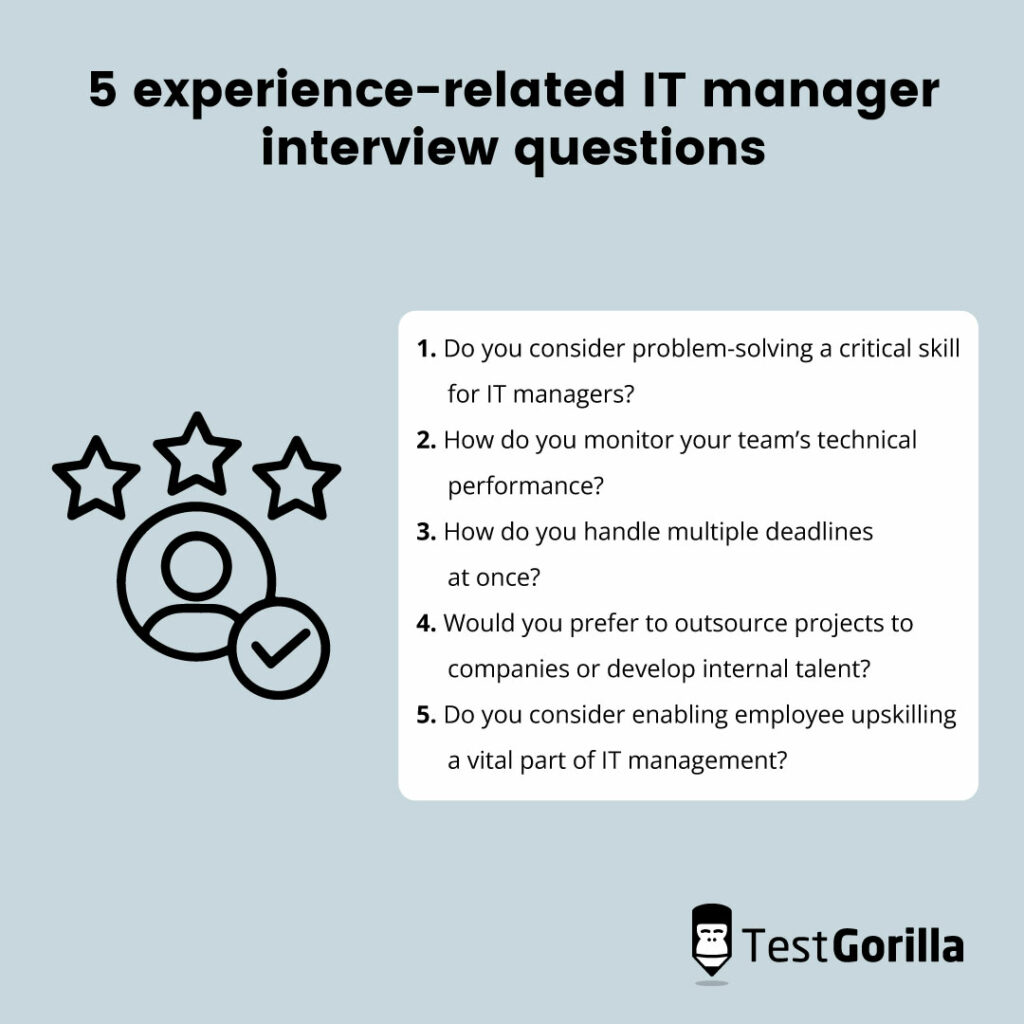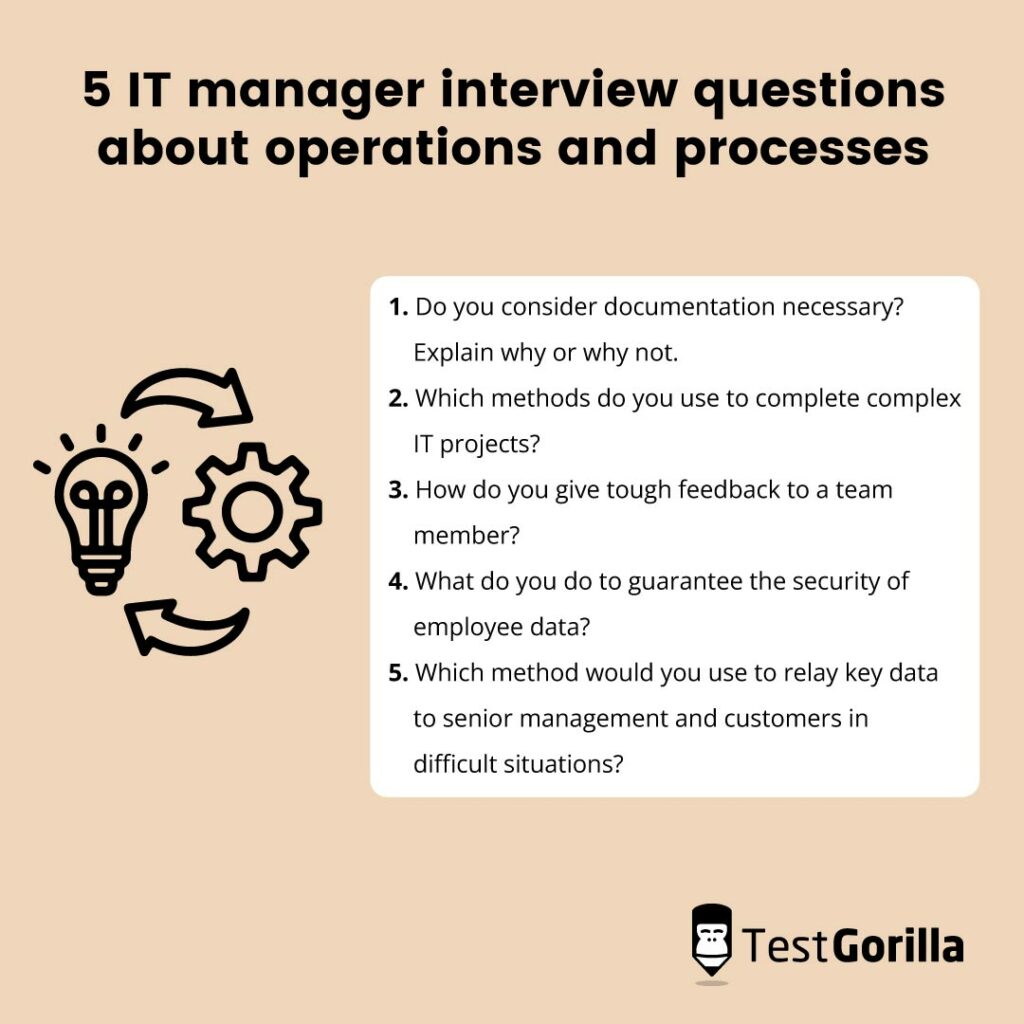35 IT manager interview questions to ask tech experts
Hiring an IT manager? There are a few steps you need to complete to make sure you hire the most qualified professional.
After you receive applications for your IT manager vacancy, ask your applicants to take a Computer and Information Systems Manager test. The test results will help you decide who to invite to an interview. Interviewing candidates enables you to gain an in-depth understanding of their experience and skills. Combine this with the data you collected during the skills assessment, and you’ll be able to make the right choice easily.
How do you choose the right IT manager interview questions, though? If you’re unsure how to tackle this task, this article is for you.
We have prepared 35 IT manager interview questions you can ask tech experts before you decide whom to hire. Have a look at the questions below to start preparing for the interview.
Table of contents
- 10 general IT manager interview questions to ask applicants
- 5 general IT manager interview questions and sample answers
- 15 IT manager interview questions about experience and skills
- 5 experience-related IT manager interview questions and sample answers
- 10 IT manager interview questions about operations and processes
- 5 IT manager interview questions and answers about operations and processes
- At what stage of the hiring process should you use these IT manager interview questions?
- Evaluate your applicants with skills tests and the right IT manager interview questions
10 general IT manager interview questions to ask applicants
Ask candidates some of these general IT manager interview questions to learn about their managerial career and interest in this role.
1. Why have you chosen IT management as a career? What do you like about working in IT?
2. Why did you choose to apply for this IT management role at our company?
3. What is your IT management style?
4. What does success in an IT management role mean to you?
5. What’s one IT management skill you need to improve?
6. What is your best IT management skill?
7. Tell us which part of IT management you consider the most rewarding.
8. Can you explain to us what you want to achieve within 10 years?
9. Do you consider communication an essential skill for IT management?
10. Do you consider time management a vital skill for IT management?
5 general IT manager interview questions and sample answers
Check the sample answers to these five crucial IT manager interview questions to assess your candidates’ responses.
1. What is your best IT management skill?
By asking this interview question and the right follow-up questions, you can check if your candidates have the right skills for your role. From critical thinking to attention to detail, there are many IT management skills that can make it easier for applicants to complete complex tasks.
Critical thinking helps IT managers to anticipate future technology requirements, while attention to detail helps them detect issues and improve the efficiency of systems.
You can assess your applicants’ skills using our Attention to Detail and Critical Thinking tests.
2. What’s one IT management skill you need to improve?
To increase their productivity and abilities to manage a team, IT managers should aim to improve their skills continuously. Whether they mention that they need to improve their project-management or leadership skills, check whether they’re able to explain how they plan to achieve this goal.
For example, applicants might attend conferences to hone their communication and leadership skills or to get familiar with the latest developments in IT management.
If you need a data-driven method to review your candidates’ communication or leadership skills, use our Communication or Leadership and People Management tests.
3. Do you consider communication an essential skill for IT management?
Managers spend as much as 80% of their workday communicating with others, which is why communication skills are fundamental for the role.
This skill helps managers motivate their teams, launch new initiatives, explain to stakeholders and employees how new systems work, and build relationships with company leaders. With this question, you’ll be able to check whether your candidates understand why communication is crucial for their role.
You can use our Communication skill test to evaluate your candidate’s communication skills, including active listening and written communication.
4. Why did you choose to apply for an IT management role with our company?
Candidates should show enthusiasm when explaining why they have applied for your vacancy. To prove they are eager to join your company, they should show they’ve researched your company and talk about the factors that attracted them.
Consider applicants who know your company’s mission and vision and are able to explain if and how they match their values.
5. What is your IT management style?
It’s important to know whether the management style of your candidate fits the requirements of the role.
Additionally, some IT managers might use different management styles depending on the situation, so your candidate might mention a few different approaches they’re using in common situations.
For example, if they manage a junior employee, they may rely more on their authority to guide them. If they are working with a senior employee, they might use a consultative management style.
Asking follow-up questions will help you determine whether an applicant has a management style that matches your company and team before you hire them.
The best insights on HR and recruitment, delivered to your inbox.
Biweekly updates. No spam. Unsubscribe any time.
15 IT manager interview questions about experience and skills
Ask your potential IT managers some of these questions to learn more about their experience and skills.
1. Can you describe your technical background and experience?
2. Do you consider yourself hands-on when technical problems arise?
3. Would you prefer to outsource projects to companies or develop talent internally?
4. Could you tell us which skills would enable you to manage our IT team efficiently?
5. How do you monitor your team’s technical performance?
6. Could you tell us about your project management experience?
7. What do you consider to be the most important part of IT management?
8. How would you handle errors that occur in the workplace?
9. How many people do you manage in your current IT management role?
10. What would you do if a team member isn’t performing well?
11. Could you tell us how you would motivate your team in difficult circumstances?
12. Describe your biggest challenge as an IT manager.
13. How do you handle multiple deadlines at once?
14. Do you consider problem-solving a critical skill for IT managers?
15. Do you consider enabling employee upskilling a vital part of IT management?
5 experience-related IT manager interview questions and sample answers
Refer to the five sample answers to these IT manager interview questions to assess your candidates’ responses.
1. Do you consider problem-solving a critical skill for IT managers?
Problem-solving is an essential skill for IT managers. Applicants should understand that this skill helps IT managers complete strategic planning and anticipate changes in the company’s technology needs. It ensures they’re able to make existing systems more efficient by proactively solving issues.
If you need to assess your applicants’ problem-solving skills before you hire an IT manager, the most reliable method is our Problem Solving test.
2. How do you monitor your team’s technical performance?
IT managers might use many different methods to monitor their team’s technical performance. For example, applicants might use CRM software to log and track incidents, create SQL reports, or make pivot tables.
Skilled applicants should know that there are many advantages to monitoring the IT department’s technical performance. The process can help IT managers:
Quantify the value the team provides to the organization
Calculate downtime costs
Work on improving the team’s performance
3. How do you handle multiple deadlines at once?
Applicants should have a strategy for handling multiple deadlines at once. For example, they should explain that they would manage staff and projects by prioritizing and delegating tasks to achieve the best output.
Consider applicants whose methods for coping with multiple deadlines match your company’s needs.
4. Would you prefer to outsource projects to companies or develop internal talent?
Small businesses outsource around 37% of their IT tasks, so many IT managers are familiar with the advantages of outsourcing. However, most companies prefer to upskill IT staff to enhance employee-business relationships and be better prepared to handle challenging tasks.
Ask follow-up questions to learn more about your applicants’ project completion methods and consider if their approach matches the one your organization uses.
5. Do you consider enabling employee upskilling a vital part of IT management?
A significant part of any IT manager’s role is to foster their employees’ professional development. Managers should use a number of techniques to ensure their employees are able to upskill, including providing support, courses, or training sessions.
Knowledgeable IT managers will recognize that a company can save money by retaining staff and encouraging upskilling instead of finding replacements and training new employees.
10 IT manager interview questions about operations and processes
Ask interviewees some of these 10 IT manager interview questions about operations and processes to check how they handle complex tasks.
1. Do you have a method to manage disaster recovery?
2. Do you consider documentation necessary? Explain why or why not.
3. Describe your negotiation process for acquiring new software or hardware.
4. What do you do to guarantee the security of employee data?
5. Which methods do you use to complete complex IT projects?
6. Do you have any specific methods for addressing cybersecurity threats to company data?
7. Can you tell us what is your approach to establishing goals for your department?
8. How do you give tough feedback to a team member?
9. How would you ensure you align your team’s work with the company’s goals?
10. Which method would you use to relay key data to senior management and customers in difficult situations?
5 IT manager interview questions and answers about operations and processes
Here are the sample answers to the five most crucial IT manager interview questions about operations and processes to help you assess your applicants’ responses.
1. Do you consider documentation necessary? Explain why or why not.
Accurate record-keeping is essential for the smooth functioning of IT departments, which is why IT managers must keep detailed documentation. If they fail to keep records, they might face issues during audits or even experience regulatory fallout.
Candidates should understand what international IT governance frameworks are and be able to mention examples such as COBIT (which is short for “control objectives for information and related technologies”) or ITIL (IT infrastructure library).
2. Which methods do you use to complete complex IT projects?
Applicants should have a set of methods for completing complex IT projects within the allotted budget and time frame. For example, they might use:
Project management frameworks, such as Agile or DevOps
Team collaboration tools, such as Jira, Trello, or Asana
Documentation and reporting best practices to ensure everyone is on the same page
QA processes to ensure the project meets client requirements
Additionally, they should be aware that checking in with team members regularly and offering them the support they need is instrumental to guiding their IT team to success.
3. How do you give tough feedback to a team member?
If your applicants have experience as an IT manager, they should understand how to give negative feedback constructively. For this, they might:
Schedule a one-on-one meeting
Be problem-focused and explain what the person needs to improve
Offer help and guidance
Balance the feedback with positive observations
To ensure your candidates understand why providing feedback is essential, ask them follow-up questions such as, “How can feedback enhance the company’s performance?”.
4. What do you do to guarantee the security of employee data?
Although not all IT manager roles require the handling of employee data, candidates should know the key security best practices. If you are hiring an IT manager for a small company, you might need someone who is well-versed in cybersecurity and is capable of assuming such responsibilities.
Some ways in which they can guarantee the security of employee data would be to use:
Data encryption
Strong role-based access control
Regular backups
Employee security trainings
Experts predict that the annual cost of cybercrime will reach $10.5tn by 2025, so it’s essential to hire an IT manager who’s knowledgeable of the strategies that can help reduce the risk of security breaches.
5. Which method would you use to relay key data to senior management and customers in difficult situations?
Candidates should know the importance of timely communication with upper management and customers when resolving an issue.
They should explain that they would follow the standard communication escalation policies and mention different communication channels they would use. For example, they might use phone calls or emails to share information about the issue.
At what stage of the hiring process should you use these IT manager interview questions?
The perfect time to ask applicants the IT manager interview questions from this article is after assessing their skills with the help of skills tests.
By using skills tests first, you’re able to identify the most skilled candidates and see whom to invite to an interview. This approach also helps you mitigate unconscious bias when shortlisting applicants.
Evaluate your applicants with skills tests and the right IT manager interview questions
Skills assessments and the right set of IT manager interview questions are the simplest way to evaluate candidates.
Combining these two methods will give you:
Quantitative data for applicants’ skill proficiency based on test results
Qualitative data based on your applicants’ responses to the interview questions
To start selecting the right skills tests for your IT manager assessment, check our test library. We have plenty of tests available – all you have to do is create a TestGorilla account and start building your first assessment.
After that, simply invite the best applicants to an interview to determine who is the best match for your company.
Find the best IT managers with the help of our skills assessments and interview questions: With TestGorilla, hiring the most suitable candidate is easy.
You've scrolled this far
Why not try TestGorilla for free, and see what happens when you put skills first.

















